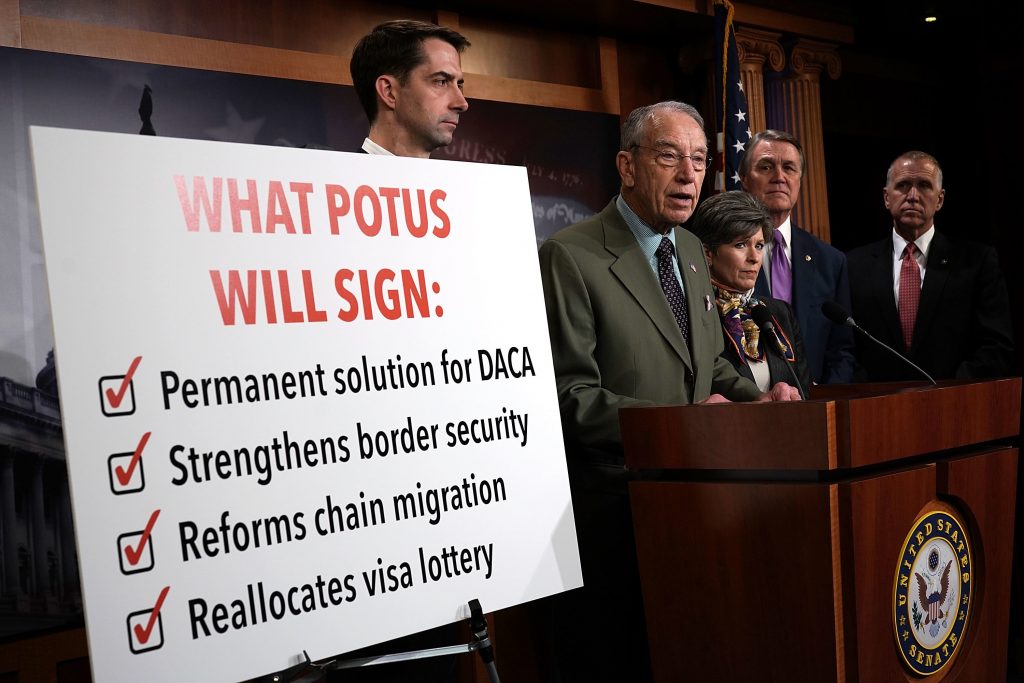As I write these words, the U.S. Senate has just begun an open-ended debate that will decide the fate of 800,000 young people who were brought to this country illegally as children.
Unfortunately, their future is now being tied to broader, more complicated questions about how to fix our broken immigration system.
I continue to believe it is cruel for our politicians to use these young people as “bargaining chips.” And this is no way for a great nation to make policy on such a crucial area as immigration.
I had hoped that Congress and the president would come together to pass narrow legislation to grant permanent legal status to these young people while agreeing to debate these broader issues separately.
There is no question that we need to reform our immigration policy to meet the new realities of the global economy and the changing shape of an American society where an estimated 10,000 baby boomers are reaching retirement age every day.
This will take thoughtfulness and expertise and most of all, time.
The issues are too complex and the stakes are too high for this debate to be carried out quickly and heatedly at the start of what is a mid-term election year.
There is still a chance that Congress could change course. But that does not seem likely, given the current political realities.
The terms of debate now are being set by the framework for immigration reform that President Trump laid out in his State of the Union address — providing a path to citizenship for the “Dreamers”; funding new border security measures; ending the diversity visa lottery; and restricting family-based immigration.
I disagree with many of the specifics in President Trump’s plan and I was deeply disappointed that he resorted to using extreme examples in making his case on “chain migration.”
But all of us who have been working for reform and immigrant rights recognize that these broad areas — border security, modernizing the visa process and giving legal status to the undocumented — are essential to fixing our broken system.
So, I hope that members of Congress and advocates are willing to at least engage this plan in a spirit of seeking compromise and trying to extend compassion to those who have come here seeking a better life.
In the last 30 years we have seen both parties try to exploit this issue for their political advantage. This has only resulted in further dividing our nation and polarizing our politics. And still people are suffering and our communities are hurting. And still our immigration system remains broken.
To me, it would be unconscionable to allow this moment to pass and risk the humanitarian nightmare of more than a million young people being deported and their families broken up. There is no political goal that could justify such an outcome.
Personally, I am encouraged that the government is now proposing a path to citizenship for these 1.8 million Dreamers.
This is a sign of hope. It means our leaders recognize what we have been telling them for many years: that no matter how these people entered this country, they are brothers and sisters who are trying to make their own contribution to the American dream.
On the security issues, again we have been saying for many years that our country needs secure borders. How we do that is for experts to decide. But the principle of border security is vital if immigration reform is to be effective and credible.
Where I disagree with the Administration is in the area of visa reform. We do need a realistic visa system that allows workers to come and go and that provides us with the kinds of workers — skilled and unskilled — that our economy needs.
It is one thing to do away with the diversity visa lottery. It is a small program that does not seem to have much impact. But we have never had an immigration policy that only looks at people for the skills they have to offer or the economic contributions they can make.
Throughout American history, immigration policy has always been about more than economics. And it has been about families, not just individuals.
Family-based immigration has served our country beautifully. Immigrant families have built vibrant neighborhoods, churches and civic institutions in every part of America.
It only makes sense that we keep family unity at the heart of our immigration policy. And family means more than just mother and father and sister and brother. It also means grandparents and aunts and uncles and cousins.
Welcoming families has allowed our country to integrate successive immigrant generations into the fabric of American life, allowing them to contribute their faith, values and talents to make this country great.
Pray for me this week and I will be praying for you.
And let us ask our Blessed Mother Mary to watch over our country and guide our leaders to do what is right.
You can follow Archbishop Gomez daily via Facebook, Twitter and Instagram.
Interested in more? Subscribe to Angelus News to get daily articles sent to your inbox.

